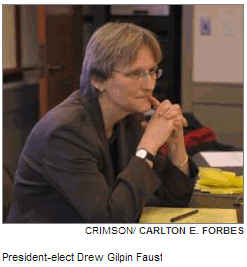|
|
|
|
|
|
|
News & Views item -
|
![]() Drew Gilpin Faust Unanimously Confirmed as Harvard's First Woman President.
(February 12, 2007)
Drew Gilpin Faust Unanimously Confirmed as Harvard's First Woman President.
(February 12, 2007)
According to The Harvard Crimson Drew Gilpin Faust was
unanimously confirmed as Harvard's first woman president Sunday afternoon by the
alumni Board of Overseers. The confirmation, usually considered a
Neil Rudenstine, who retired in 2001 to be followed by Lawrence Summers as Harvard's President told the Crimson he "couldn't be happier" about the choice of Drew Gilpin Faust to be president.
I think she is a person who can bring other people together and at the same time she has tremendous clarity of vision and she's able to be very, very decisive in her very tactful and very strong way.
[She was] the candidate to beat... She clearly stood out in the group [that included other] excellent people. She understands the institution extremely well. I think she's widely admired throughout the University.
Dr Rudenstine went on to say that Professor Faust will likely devote the next few months to contemplating two major appointments that are set to be vacant on July 1: the deanships of the Faculty of Arts and Sciences and Harvard Medical School.
In 2000 he appointed Professor Faust, who is Lincoln Professor of History in Harvard's Faculty of Arts and Sciences, to be dean of the Radcliffe Institute of Advanced Study. As dean, she is overseer of 81 staff members, fewer than 15 faculty members, and a budget of about $16 million. As president, she will oversee almost 25,000 employees and a budget of about US$3 billion.
In its editorial The Harvard Crimson opines that reform of Harvard governance will be among Professor Faust's greatest challenges. According to the Crimson, "Harvard's radically decentralised structure overly empowers its faculties and inhibits reform, encouraging wide disparities in funding among schools, and promoting internecine squabbling over major initiatives... [Ultimately] managing this entrenched academic sphere was the puzzle that cost Summers his job."